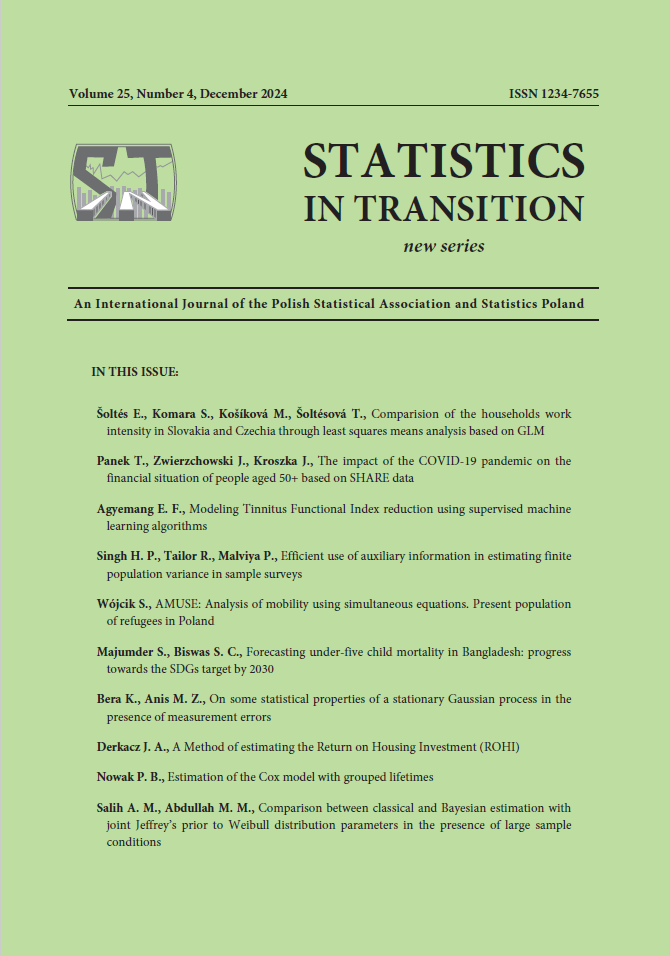ARTICLE
ABSTRACT
The aim of the study was to develop a method for estimating the profitability of housing investments. Market practice shows that the profitability of this type of investment is influenced by specific determinants that are absent in the classical approach to profitability analysis. The most commonly used method is the Return on Equity (ROE) ratio, which is dedicated to enterprises. However, housing investments are becoming increasingly popular among individuals, while the classical ROE method proved suboptimal for such ventures (i.e. those involving the purchase of residential property and its subsequent rental to third parties). In this context, we made an attempt to develop a method that would make the estimation of the profitability level of this type of investment possible. Through the decomposition of the ROE ratio, a model for the Return on Housing Investment (ROHI) was created. This model was verified using real market data. Ultimately, we found that the ROHI method allows the estimation of the profitability level while taking into consideration the most important determinants characteristic of this type of investment.
KEYWORDS
multiple equation models, multiple variables, verification of the ROE ratio, apartment rentals, Return on Housing Investment.
REFERENCES
Aalbers, M. B., Hochstenbach, C., Bosma, J. and Fernandez, R., (2021). The Death and Life of Private Landlordism: How Financialized Homeownership Gave Birth to the Buy-To-Let Market. Housing, Theory and Society, 38(5), pp. 541–563. https://doi.org/10.1080/14036096.2020.1846610.
Almagribi, M. K., Lukviarman, N. and Setiany, E., (2023). Financial Determinants of Corporate Cash Holdings: Evidence from Property and Real Estate Companies in Indonesia. Review of Integrative Business and Economics Research, 12(3), pp. 251–260.
Antczak-Stępniak, A., (2019). Determinants of Development Activity in the Polish Housing Market. Wydawnictwo Uniwersytetu Łódzkiego.
Bączar, A., Dąbrowska, A., Polak, M. and Sekścińska, K., (2024). Poziom wiedzy finansowej Polaków 2024. VII.
Byrne, M., (2020). Generation rent and the financialization of housing: A comparative exploration of the growth of the private rental sector in Ireland, the UK and Spain. Housing Studies, 35(4), pp. 743–765. https://doi.org/10.1080/02673037.2019.1632813.
Christophers, B., (2022). Mind the rent gap: Blackstone, housing investment and the reordering of urban rent surfaces. Urban Studies, 59(4), pp. 698–716.
Davis, M. A., Van Nieuwerburgh, S., (2015). Housing, Finance, and the Macroeconomy. In G. Duranton, J. V. Henderson, & W. C. Strange (Eds.). Hand-book of Regional and Urban Economics, Vol. 5A, pp. 753–811. Elsevier. https://doi.org/10.1016/B978-0-444-59531-7.00012-0.
de Clippel, G., Rozen, K., (2021). Bounded rationality and limited data sets. Theoretical Economics, 16(2), pp. 359–380. https://doi.org/10.3982/TE4070.
Dufrénot, G., (2023). Interest Rates, Financial Markets, and Macroeconomics. In G. Dufrénot, New Challenges for Macroeconomic Policies. Springer International Publishing, pp. 195–257. https://doi.org/10.1007/978-3-031-15754-7_5.
Fernandez, R., Aalbers, M. B., (2017). Housing and Capital in the Twenty-first Century: Realigning Housing Studies and Political Economy. Housing, Theory and Society, 34(2), pp. 151–158. https://doi.org/10.1080/14036096.2017.1293379.
Gadowska-dos Santos, D., (2018). Istota i skala finansjalizacji rynku nieruchomości mieszkaniowych w Polsce w latach 2000–2015. Studia i Prace Kolegium Zarzą-dzania i Finansów, 165, pp. 111–140. https://doi.org/10.33119/SIP.2018.165.7.
Gertsekovich, D., Gorbachevskaya, L., Grigorova, L. and Peshkov, V., (2019). Return on investment in REIT real estate funds. IOP Conference Series: Materials Science and Engineering, 667(1), 012025. https://doi.org/10.1088/1757-899X/667/1/012025.
Gołąbeska, E., (2017). Współczesne trendy na rynku nieruchomości mieszkaniowych. In E. Broniewicz (Ed.), Gospodarowanie przestrzenią w warunkach rozwoju zrów-noważonego. Oficyna Wydawnicza Politechniki Białostockiej, pp. 85–106.
Haran, M., McCord, M., Davis, P., McCord, J., Lauder, C. and Newell, G., (2016). European emerging real estate markets: Re-examining investment attributes and framing opportunities. Journal of Property Investment & Finance, 34(1), pp. 27–50. https://doi.org/10.1108/JPIF-04-2015-0024.
Ichsani, S., Suhardi, A. R., (2015). The Effect of Return on Equity (ROE) and Return on Investment (ROI) on Trading Volume. Procedia – Social and Behavioral Sciences, 211(25), 896–902. https://doi.org/10.1016/j.sbspro.2015.11.118.
Koćwin, J., (2021). Ethics in the financial services market. Knowledge, consumer edu-cation and morality. Wrocławsko-Lwowskie Zeszyty Prawnicze, 12(1), pp. 37–52.
Konowalczuk, J., (2018). Households Investments in the Residential Real Estate Market. Świat Nieruchomości, 1(103), pp. 21–28.
Krulický, T., Horák, J., (2019). Real estate as an investment asset. SHS Web of Conferences, 61(010011). https://doi.org/10.1051/shsconf/20196101011.
Laszek, J., Augustyniak, H. and Olszewski, K., (2021). The development of the rental market in Poland. In Real Estate at Exposure. New Challenges, Old Problems, Oficyna Wydawnicza SGH, pp. 263–274.
Laszek, J., Olszewski, K., (2015). The behaviour of housing developers and aggregate housing supply. NBP Working Paper, 206. http://dx.doi.org/10.2139/ssrn.2642756.
Lejarraga, J., Pindard-Lejarraga, M., (2020). Bounded Rationality: Cognitive Limita-tions or Adaptation to the Environment? The Implications of Ecological Rationality for Management Learning. Academy of Management Learning & Education, 19(3), pp. 289–306. https://doi.org/10.5465/amle.2019.0189.
Piętka, A., (2023). Residential private rental market in Poland – prospects and challenges. Studia BAS, 4, pp. 9–25.
Renigier-Bilozor, M., Wisniewski, R. and Bilozor, A., (2017). Rating attributes toolkit for the residential property market. International Journal of Strategic Property Management, 21(3), 307–317. https://doi.org/10.3846/1648715X.2016.1270235.
Ronald, R., (2008). The ideology of home ownership: Homeowner societies and the role of housing. Palgrave Macmillan. https://books.google.com/books?hl=pl&lr=&id= gCuHDAAAQBAJ&oi=fnd&pg=PR1&dq=R.+Ronald,+The+Ideology+of+Home+Ownership.+Homeowner+Societies+and+the+Role+of+Housing,+Houndmills,+Palgrave+Macmillan,+UK+2008&ots=h73qvHBfjv&sig=5psTs31ue8t3Y2xJ0Ve6cKz25kg.
Simcock, T., (2023). Home or hotel? A contemporary challenge in the use of housing stock. Housing Studies, 38(9), pp. 1760–1776. https://doi.org/10.1080/02673037. 2021.1988063.
Szczechowiak, E., (2020). Economic education and the entrepreneurial attitudes of students. Report on research on saving and spending money. In W. Truszkowski (Ed.), Uwa-runkowania budowy bezpieczeństwa prawnego, ekonomicznego i społecznego w Polsce (p. 89), Uniwersytet Warmińsko-Mazurski w Olsztynie.
Tomal, M., (2017). Identifying the factors that significantly influence decisions to make housing development investments in the communes of Małopolska province. Folia Pomeranae Universitatis Technologiae Stetinensis, 88(337), pp. 67–76.
Wijburg, G., Aalbers, M. B., (2017). The alternative financialization of the German housing market. Housing Studies, 32(7), pp. 968–989. https://doi.org/10.1080/ 02673037.2017.1291917.
Wójcik, A., (2016). Residential Real Estate as an Investment Instrument. Annales Universitatis Mariae Curie-Skłodowska, L(3), pp. 195–203.
